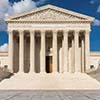Court Analyzes Free Speech Rights Of Public Employee Who Associated With Co-Worker Facing Discipline

July 2011
Number 30
On June 24, 2011, the United States Ninth Circuit Court of Appeals issued a decision in Nichols v. Dancer (9th Cir. 2011) __ F.3d __ ("Nichols"), which analyzes a public employer's right to limit an employee's freedom to communicate and associate with a co-worker who is the subject of pending disciplinary action.
In Nichols, the court held that a true "balancing test" must be used when a public employer implicates the First Amendment by disciplining public employees for their communications or�associations with other employees. The balance will normally tip in the employer's favor when the employer can show that such communications or associations cause an actual workplace disruption or that a disruption is reasonably likely to occur in the future.
In the Nichols case, plaintiff Kathleen Nichols was employed by the Washoe County School District ("District") as an administrative assistant to the District's General Counsel, Jeffrey Blanck. Ms. Nichols provided litigation support to Mr. Blanck and maintained a social relationship with him outside of the workplace. In late 2003, Mr. Blanck alleged that the District's superintendent had misused District funds. In January 2004, Mr. Blanck was suspended and removed from the General Counsel's office and Ms. Nichols was transferred to the Human Resources (HR) Department while the District considered whether to retain or dismiss Mr. Blanck.
On March 23, 2004, the school board took action to dismiss Mr. Blanck at a public school board meeting. The day before, on March 22, the District's HR director told Ms. Nichols that she would be reinstated to her former position in the General Counsel's office regardless of whether Mr. Blanck was fired or retained. Under that belief, Ms. Nichols attended the March 23rd school board meeting to watch a co-worker receive an award, and to see if Mr. Blanck would keep his job. Ms. Nichols sat next to Mr. Blanck at the meeting but did not speak to him.
Following the board meeting, the HR director told Ms. Nichols that she would not be transferred back to the General Counsel's office. The District questioned Ms. Nichols's loyalty because she had attended the March 23rd meeting and sat next to Mr. Blanck. The District presented Ms. Nichols with two disciplinary alternatives: she could stay in the HR assignment with a frozen salary, or take an early retirement. Ms. Nichols chose early retirement but later sued the District alleging that she was demoted in retaliation for exercising her First Amendment rights to attend the school board meeting and sit next to (i.e., associate with) Mr. Blanck.
At the trial level, the court granted summary judgment in favor of the District on the basis that, under Pickering v. Board of Education (1968) 391 U.S. 563, the District's interest in an efficient workplace without disloyal employees outweighed Ms. Nichols's First Amendment interest to freely associate with Mr. Blanck at the Board meeting. Ms. Nichols appealed to the Ninth Circuit Court of Appeals, and the Ninth Circuit reversed the trial court decision.
In its decision, the Ninth Circuit first acknowledged that public employers have significant leeway to regulate employee speech and to discipline employees if employee conduct disrupts the workplace. The court stated, "we must give public employers wide discretion and control over the management of their personnel and internal affairs, including the prerogative to remove employees whose conduct hinders efficient operation and to do so with dispatch."
The court then noted however, that this discretion is not unfettered and that the public employer's interest in promoting efficient public services must be balanced with a citizen's interest in commenting on matters of public concern. Generally, the balance weighs in favor of an employer when an employee's conduct disrupts the workplace by: (1) impairing discipline by supervisors; (2) impairing harmony among co-workers; (3) detrimentally impacting close working relationships that require loyalty and confidence; (4) impeding performance of the employee's duties; or (5) interfering with the regular operation of the enterprise. This can be proven through evidence of an actual disruption or of a reasonable prediction of a disruption.
The court held that the District failed to produce evidence showing either an actual disruption caused by Ms. Nichols's association with Mr. Blanck, or that it was reasonable to believe that such association threatened the District's operations. Instead, the court commented that Ms. Nichols was simply "caught in the crossfire" between the District and her former boss.
The Nichols case analyzes the boundaries of a public employer's right to discipline, discharge or demote an employee for taking action on a matter of public concern. Because a public employer is vulnerable to First Amendment constitutional claims if it restricts an employee's right to free speech and association, it is important to consult with legal counsel whenever the First Amendment is implicated in a disciplinary action.
If you have any questions regarding this decision, please do not hesitate to contact any of our eight offices located statewide, or consult our website.
�
Darren Kameya
Senior Counsel and Labor & Employment Practice Group Co-Chair
Los Angeles Office
dkameya@lozanosmith.com
�
Regina Garza
Associate
Fresno Office
rgarza@lozanosmith.com
�
2011 Lozano Smith
Number 30
On June 24, 2011, the United States Ninth Circuit Court of Appeals issued a decision in Nichols v. Dancer (9th Cir. 2011) __ F.3d __ ("Nichols"), which analyzes a public employer's right to limit an employee's freedom to communicate and associate with a co-worker who is the subject of pending disciplinary action.
In Nichols, the court held that a true "balancing test" must be used when a public employer implicates the First Amendment by disciplining public employees for their communications or�associations with other employees. The balance will normally tip in the employer's favor when the employer can show that such communications or associations cause an actual workplace disruption or that a disruption is reasonably likely to occur in the future.
In the Nichols case, plaintiff Kathleen Nichols was employed by the Washoe County School District ("District") as an administrative assistant to the District's General Counsel, Jeffrey Blanck. Ms. Nichols provided litigation support to Mr. Blanck and maintained a social relationship with him outside of the workplace. In late 2003, Mr. Blanck alleged that the District's superintendent had misused District funds. In January 2004, Mr. Blanck was suspended and removed from the General Counsel's office and Ms. Nichols was transferred to the Human Resources (HR) Department while the District considered whether to retain or dismiss Mr. Blanck.
On March 23, 2004, the school board took action to dismiss Mr. Blanck at a public school board meeting. The day before, on March 22, the District's HR director told Ms. Nichols that she would be reinstated to her former position in the General Counsel's office regardless of whether Mr. Blanck was fired or retained. Under that belief, Ms. Nichols attended the March 23rd school board meeting to watch a co-worker receive an award, and to see if Mr. Blanck would keep his job. Ms. Nichols sat next to Mr. Blanck at the meeting but did not speak to him.
Following the board meeting, the HR director told Ms. Nichols that she would not be transferred back to the General Counsel's office. The District questioned Ms. Nichols's loyalty because she had attended the March 23rd meeting and sat next to Mr. Blanck. The District presented Ms. Nichols with two disciplinary alternatives: she could stay in the HR assignment with a frozen salary, or take an early retirement. Ms. Nichols chose early retirement but later sued the District alleging that she was demoted in retaliation for exercising her First Amendment rights to attend the school board meeting and sit next to (i.e., associate with) Mr. Blanck.
At the trial level, the court granted summary judgment in favor of the District on the basis that, under Pickering v. Board of Education (1968) 391 U.S. 563, the District's interest in an efficient workplace without disloyal employees outweighed Ms. Nichols's First Amendment interest to freely associate with Mr. Blanck at the Board meeting. Ms. Nichols appealed to the Ninth Circuit Court of Appeals, and the Ninth Circuit reversed the trial court decision.
In its decision, the Ninth Circuit first acknowledged that public employers have significant leeway to regulate employee speech and to discipline employees if employee conduct disrupts the workplace. The court stated, "we must give public employers wide discretion and control over the management of their personnel and internal affairs, including the prerogative to remove employees whose conduct hinders efficient operation and to do so with dispatch."
The court then noted however, that this discretion is not unfettered and that the public employer's interest in promoting efficient public services must be balanced with a citizen's interest in commenting on matters of public concern. Generally, the balance weighs in favor of an employer when an employee's conduct disrupts the workplace by: (1) impairing discipline by supervisors; (2) impairing harmony among co-workers; (3) detrimentally impacting close working relationships that require loyalty and confidence; (4) impeding performance of the employee's duties; or (5) interfering with the regular operation of the enterprise. This can be proven through evidence of an actual disruption or of a reasonable prediction of a disruption.
The court held that the District failed to produce evidence showing either an actual disruption caused by Ms. Nichols's association with Mr. Blanck, or that it was reasonable to believe that such association threatened the District's operations. Instead, the court commented that Ms. Nichols was simply "caught in the crossfire" between the District and her former boss.
The Nichols case analyzes the boundaries of a public employer's right to discipline, discharge or demote an employee for taking action on a matter of public concern. Because a public employer is vulnerable to First Amendment constitutional claims if it restricts an employee's right to free speech and association, it is important to consult with legal counsel whenever the First Amendment is implicated in a disciplinary action.
If you have any questions regarding this decision, please do not hesitate to contact any of our eight offices located statewide, or consult our website.
�
Darren Kameya
Senior Counsel and Labor & Employment Practice Group Co-Chair
Los Angeles Office
dkameya@lozanosmith.com
�
Regina Garza
Associate
Fresno Office
rgarza@lozanosmith.com
�
2011 Lozano Smith
As the information contained herein is necessarily general, its application to a particular set of facts and circumstances may vary. For this reason, this News Brief does not constitute legal advice. We recommend that you consult with your counsel prior to acting on the information contained herein.






